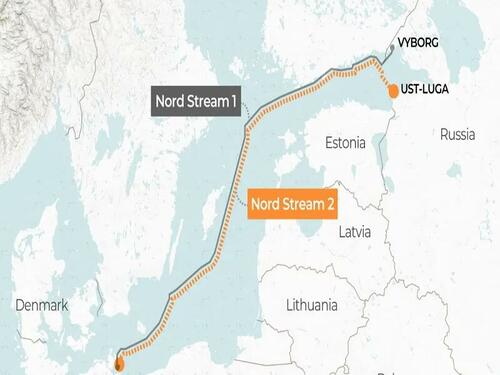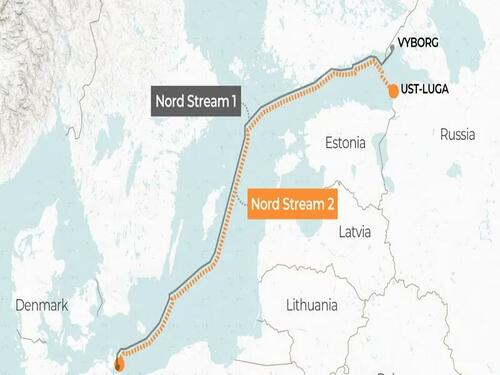Why Might The US Let An American Investor Buy The Bankrupt Nord Stream Project?
Authored by Andrew Korybko via substack,
The Wall Street Journal reported last week that “A Miami Financier Is Quietly Trying to Buy Nord Stream 2 Gas Pipeline” if it soon goes to auction in a Swiss bankruptcy proceeding. They described how Stephen P. Lynch has a history of conducting business in Russia and he’s also quoted as saying that “This is a once-in-a-generation opportunity for American and European control over European energy supply for the rest of the fossil-fuel era.” That’s true, and it could play a key role in any grand Russian-US compromise.
“Everyone Missed The Most Important Part Of The First Putin-Scholz Call In Two Years” earlier this month after Putin made a pass at Scholz hinting that the last undamaged part of this project could be put back to use if Germany helps de-escalate the Ukrainian Conflict instead of contributing to its escalation. Germany is on the brink of a recession due in large part to high energy costs brought about by its compliance with US pressure to sanction Russia. It’s therefore interested in cheap and reliable energy.
At the same time, Trump is expected to pressure the EU into supporting his trade war against China. This will already be difficult enough to do as it is, especially since China and the EU are about to patch up their electric vehicle dispute and China is the EU’s second largest trade partner. There’s almost no chance that they’ll go along with this if they enter into a recession caused by Germany’s economic downturn. Trump thus has an interest in restoring some of its cheap Russian energy imports as an incentive.
The US would get a cut through Lynch’s ownership of this project, which would also allow America to shut off these imports if Germany enters into too speedy of a rapprochement with Russia, such as if it refuses to continue arming Ukraine or paying for a lot of its reconstruction after the conflict ends. Germany might accept these terms in exchange for the immediate economic relief that it could provide, while Russia might be grateful for the additional budgetary revenue that this arrangement could bring.
It’s an imperfect compromise, but it’s a compromise nonetheless, and it could accordingly play a key role in any grand Russian-US compromise over Ukraine. If Russia doesn’t object to the US controlling some of its energy flow to Germany, then it might also not object to selling some of the critical minerals that it could extract from Ukrainian-claimed territory to the US as well. This complementary compromise could dissuade Trump from escalating the conflict to obtain control over those resources like Zelensky wants.
After all, Russia still sells nickel and titanium to the US in spite of their ongoing proxy war in Ukraine, and India could always serve as an alternative conduit to that market just like it does to the European energy one after they sanctioned Russia if Russia bans the export of these minerals to the US. With this in mind, even if the EU doesn’t go along with Trump’s trade war plans against China, the US could still reap some strategic benefits, though it might have to sweeten the deal through phased sanctions relief for Russia.
Therein lies the guiding principle behind this proposal for a grand Russian-US compromise. The complex interdependencies between Russia and the West, which were explained at length here with regard to why Russia is receptive to resuming ties with the IMF, account for why the abovementioned “politically inconvenient” trade relationships are still in place to this day. Neither has the political will to cut the other off in full because this would be mutually detrimental to their interests.
They might thus agree that it’s better to restore the undamaged part of the Nord Stream pipelines under American ownership while reaching an agreement for Russia to sell some of the critical minerals that it extracts from Ukrainian-claimed territory to the US in order to dissuade Trump from escalating the conflict. The supplementary benefit is that the US could raise the odds of the EU partially complying with its predictably upcoming demands to economically pressure China even if it still ultimately refuses.
Having explained why this arrangement might work, it’s time to share three arguments against it.
-
First, the anti-Russian faction of the US’ permanent military, intelligence, and diplomatic bureaucracies might still be powerful enough to oppose it.
-
Second, Russia might accept the cost of lost budgetary revenue from resource sales to the West for reasons of strategic sovereignty.
-
And finally, Germany might feel pressured by very vocal anti-Russian EU members like Poland into keeping the pipeline closed.
Reflecting on everything, it’s unclear whether the US will allow Lynch to purchase this bankrupt project if it soon goes to auction in a Swiss bankruptcy proceeding.
They’ll only greenlight it if they feel that it could play a key role in a grander Russian-US compromise, thus requiring Moscow and Berlin to informally signal support of this ahead of time, which could be done through bilateral backchannels. In any case, observers should still keep an eye on this since it’s a low-probability but high-impact scenario.
Tyler Durden
Wed, 11/27/2024 – 05:00



Recent Comments